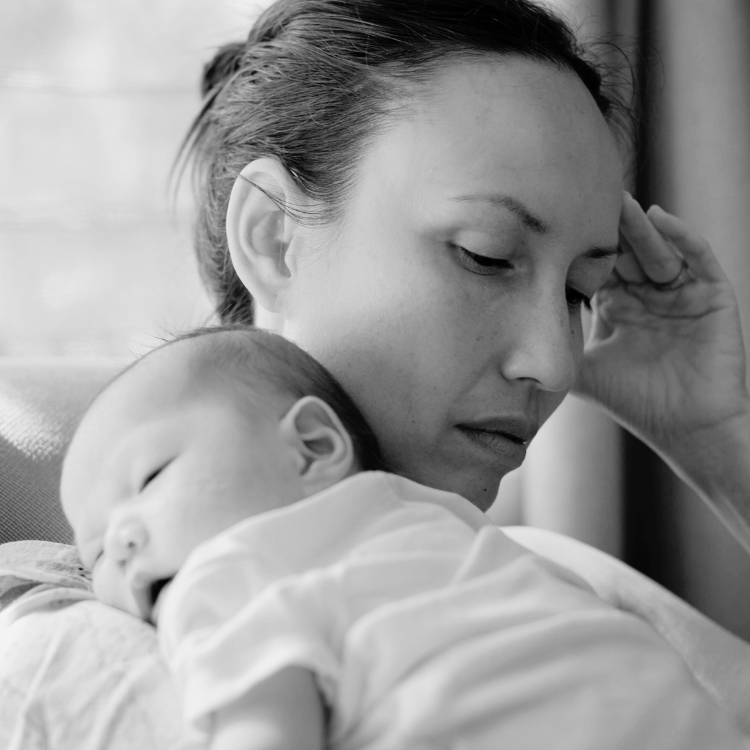The Silent Struggle
Picture this: You've just given birth to a beautiful baby. Everyone around you is celebrating, but you're feeling... off. The happiness you expected isn't quite there. Instead, you're overwhelmed by fatigue, sadness, irritability, feelings of guilt, and a creeping sense of inadequacy. Confusion and anxiety about these unexpected emotions cloud your mind. If this sounds familiar, you're not alone.
While bringing a new life into the world is indeed a joyous time, for many women the reality is far more complex. More than just the "baby blues," postpartum depression (PPD) is a condition that affects 10-20% of new mothers. It typically emerges within the first four weeks after childbirth but can sneak up on you anytime during that crucial first year.
Tragically, it's estimated that nearly 50% of mothers with postpartum depression are not diagnosed by a health professional. This alarming statistic raises important questions: Why are so many women not receiving professional help, and what can be done to improve awareness?
Barriers to Diagnosis
The underdiagnosis of postpartum depression is a complex issue rooted in various personal, social, and systemic factors. To effectively address this problem, it's crucial to examine the obstacles that prevent many mothers from receiving timely and appropriate care. By identifying these barriers, we can develop targeted strategies to improve detection rates and ensure that more women receive the support they need during this vulnerable time.
Let's delve into the key factors that contribute to the underdiagnosis of PPD:
- Stigma and shame: Many mothers feel embarrassed about experiencing negative emotions during what's supposed to be a joyous time.
- Lack of awareness: Some mothers may not recognize their symptoms as PPD, mistaking them for normal new parenthood stress.
- Limited screening: Not all healthcare providers routinely screen for PPD during postpartum check-ups.
- Time constraints: New mothers often prioritize their baby's health over their own, skipping check-ups or not mentioning symptoms.
- Cultural barriers: In some cultures, mental health issues are taboo, discouraging mothers from seeking help.
- Fear of judgment: Mothers may worry about being seen as "bad mothers" or fear losing custody if they admit to struggling.
- Lack of access to healthcare: Some mothers may not have adequate health insurance or access to mental health services.
- Minimizing symptoms: Mothers might downplay their symptoms, believing they should handle everything alone.
- Conflicting symptoms with new motherhood: Many PPD symptoms, like fatigue, can be mistaken for normal experiences of new motherhood.
- Focus on physical health: Postpartum check-ups often prioritize physical recovery, potentially overlooking mental health concerns.
Breaking the Silence: Recognition and Treatment
Changing this narrative starts with awareness and open conversation. If you're a new mother experiencing persistent feelings of sadness, anxiety, or detachment, know that these feelings are valid, and that help is available. For those who have new mothers in their lives, be attentive to potential signs of PPD and extend compassionate, non-judgmental support.
It's crucial to understand that PPD isn't just a "mom problem". Its effects can ripple out, touching the entire family. Children of mothers with untreated PPD are more likely to face developmental delays, behavioral issues, and emotional challenges. This underscores the importance of early recognition and treatment – not just for the mother's well-being, but for the health of the entire family unit.
Targeted treatment for PPD typically involves a multi-pronged approach tailored to the individual's needs, including therapy (such as Cognitive Behavioral Therapy or Interpersonal Therapy), medication, support groups, self-care practices, education, family support, and in some cases, alternative therapies or hospitalization.
For working mothers, PPD can be particularly challenging. The pressure to "have it all together" can be immense, often leading to heightened feelings of guilt and inadequacy. Strategies for navigating this difficult time include communicating with employers about flexible arrangements, setting realistic expectations, building a strong support network, practicing self-compassion, and seeking professional help when needed.
A Call to Action
Postpartum depression is a serious condition, but it's not insurmountable. With proper recognition and treatment, mothers can recover and thrive. It's time to break the silence surrounding PPD and create a society where all new mothers feel supported and understood.
Actors like Gwyneth Paltrow, Brooke Shields, and Courteney Cox have shared their personal experiences with PPD, helping to raise awareness about this condition. Their stories of struggle, diagnosis, and recovery highlight an important message: if you're facing PPD, remember that you're not alone and it's not your fault. With proper support and treatment, you can and will feel better. Don't hesitate to seek help - your health and well-being are crucial, not only for you but also for your baby and your entire family.
So, let's change the narrative around postpartum depression. It's not a sign of weakness or failure – it's a medical condition that deserves attention, understanding, and proper care. By shining a light on PPD, we can ensure that every mother has the support she needs to navigate the beautiful, challenging journey of parenthood.
Resources:
- Call or text the National Maternal Mental Health Hotline at 1-833-852-6262 (TLC-MAMA), which is free, confidential, and available 24/7. Counselors speak both English and Spanish.
- NAMI (National Alliance on Mental Illness): Mental Health for New Parents

